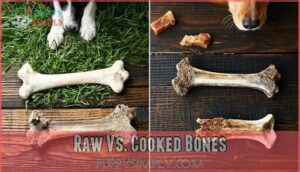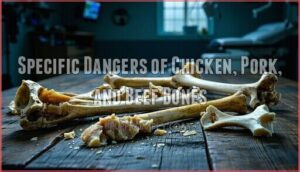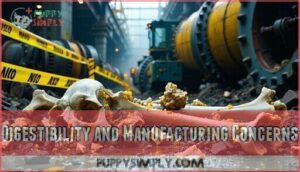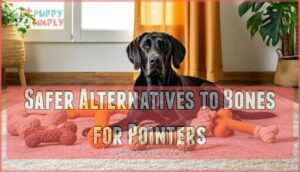This site is supported by our readers. We may earn a commission, at no cost to you, if you purchase through links.

Veterinarians routinely extract bone fragments from pointer intestines and repair fractured canine teeth from overzealous chewing sessions. The question isn’t whether your pointer wants to chew bones—their prey drive guarantees they do—but whether their digestive system and teeth can survive the habit.
Understanding the specific risks for pointing breeds, from German Shorthaired Pointers to English Pointers, helps you protect your dog from preventable dental fractures, intestinal blockages, and bacterial infections while still satisfying their instinctive need to chew.
Table Of Contents
Key Takeaways
- Pointers’ hunting heritage drives intense chewing instincts, but their anatomy lacks the dental strength to safely handle bones, leading to fractured teeth (affecting 14-27% of dogs), intestinal blockages requiring emergency surgery in 20% of cases, and bacterial infections from contaminated raw bones.
- Cooked bones splinter into dangerous fragments that puncture digestive tracts, while raw bones carry Salmonella, E. coli, and Listeria risks—with chicken bones being particularly hazardous and pork bones causing 2-3 times more gastrointestinal distress than other types.
- Despite claims that bones clean teeth, hard bones fracture carnassial teeth at alarming rates and expose pulp to infection, making veterinary-approved alternatives like firm rubber toys, prescription dental diets (Hill’s T/D), and daily tooth brushing safer for maintaining oral health.
- Breed-specific factors matter—German Wirehaired Pointers chew more aggressively than English Pointers—but veterinarians recommend avoiding bones entirely for all Pointers and limiting any supervised chewing sessions with approved alternatives to 10-15 minutes to prevent jaw fatigue and digestive complications.
Can Pointers Safely Chew on Bones?
You might wonder if your Pointer can safely gnaw on bones like dogs have done for centuries. The answer isn’t straightforward—while chewing satisfies natural instincts, it comes with real medical risks that vary by bone type and individual dog.
Let’s break down what makes Pointers unique as chewers and whether bones fit into their health routine.
Differences in Pointer Breeds and Chewing Behavior
Not all Pointers are created equal in terms of their jaw-dropping dedication to chewing—German Shorthaired, German Wirehaired, and English Pointers each bring their own temperament and energy levels to the bone. Breed variations matter because a high-strung German Wirehaired Pointer may attack bones more aggressively than a calmer English Pointer, increasing the risk of dental fractures.
Pointer genetics influence jaw structure and chewing styles, so understanding your dog’s breed temperament helps you assess canine behavior and dog bone safety before handing over bones for dogs.
Natural Instincts and Needs for Chewing
Chewing isn’t just a pastime for Pointers—it’s hardwired into their DNA as hunting dogs who once carried game in their mouths and needed strong jaws to do the job. These instinctual needs drive natural habits that demand oral satisfaction and jaw exercise, making chewing bones tempting for canine dental health.
Your Pointer craves chewing behavior for:
- Stress relief and boredom-busting entertainment
- Gum stimulation and natural teeth cleaning
- Mental enrichment through problem-solving work
Raw bones may seem like the perfect outlet, but dog bone safety requires weighing these needs against real risks.
How Pointers Compare to Other Dog Breeds
When comparing breed popularity and chewing habits, Pointers and German Shorthaired Pointers consistently rank among the top 50 registered dog breeds with the American Kennel Club—far outpacing rare breeds like Pudelpointers. This widespread ownership matters for bone safety because temperament traits directly influence chewing intensity. German Shorthaired Pointers exhibit higher prey drive and require more structured leadership, while English Pointers display calmer indoor behavior. Both breeds demand extensive daily exercise to prevent destructive chewing from boredom, a common trigger for bone-related dog health issues. Understanding their high energy requirements and need for regular exercise, such as outdoor activities, is vital for their overall well-being.
| Breed Characteristic | English Pointer | German Shorthaired Pointer |
|---|---|---|
| Indoor Temperament | Calmer, laid-back | Higher energy, more stimulation needed |
| Field Independence | Strong independent style | More natural check-back behavior |
| Cold Weather Tolerance | Lower (fine coat) | Higher (denser, muscular build) |
| Retrieving Instinct | Less natural | Strong natural tendency |
Their athletic builds and deep chests increase health concerns like gastric dilatation-volvulus, making bone obstruction especially dangerous. Training styles also differ—English Pointers respond better to exposure-based methods, while German Shorthaired Pointers tolerate structured correction. Understanding these breed-specific differences helps you assess canine dental health risks and choose appropriate bone safety alternatives for your dog’s unique temperament and physical needs.
Health Risks of Bone Chewing in Pointers
When you give your Pointer a bone to chew, you’re rolling the dice on their health—and the stakes are higher than most owners realize.
Giving your Pointer a bone means gambling with their health—the stakes include fractured teeth, blockages, and life-threatening emergencies
From fractured teeth to life-threatening blockages, the risks span your dog’s entire digestive system. Let’s break down the specific dangers you need to watch for.
Gastrointestinal Irritation and Vomiting
When bones hit the gastrointestinal tract, trouble often follows. Vomiting ranks as the most common complaint—83% of dogs with gastric bone foreign bodies showed this symptom. Bone fragments irritate the stomach lining, causing digestive upset and discomfort.
In severe cases, esophageal or intestinal obstruction develops, turning a simple chew session into an emergency. Contaminated bones can trigger vomiting within 30 to 45 minutes, signaling immediate gastrointestinal problems in dogs. Understanding dog bone risks is vital for preventing such issues.
Tooth Fractures and Dental Injuries
Dental trauma doesn’t discriminate—14–27% of dogs experience tooth fractures, often from chewing hard bones. Premolars and canines take the brunt, accounting for 39% and 33.3% of fractures respectively. When your pointer chomps down on unyielding bone, forces can exceed 1,281 Newtons, shattering teeth and exposing pulp.
These complicated crown fractures often require oral surgery, and 69.2% go unnoticed until routine exams. Gum disease and jaw injuries compound the problem, threatening long-term canine dental health.
Risk of Bone Splintering and Obstruction
Splintering transforms bone from treat to threat. Cooked bones—especially chicken—turn brittle and fracture into sharp daggers that puncture the gastrointestinal tract, triggering hemorrhagic gastroenteritis or peritonitis. Bone accounts for 30–80% of esophageal foreign bodies in dogs, with 20% of bone-chewing dogs needing emergency care.
Of 45 obstructed dogs, 93% needed endoscopic removal; 7% required surgical esophagotomy. Bone meal ingestion caused gastrointestinal impaction in 1.2% of cases, with some requiring exploratory surgery or resulting in fatality.
Obstruction symptoms demand immediate action:
- Vomiting and gagging (reported in multiple emergency cases)
- Regurgitation and straining to defecate
- Lethargy and abdominal pain
- Complete digestive tract blockage requiring anesthesia
Bacterial Contamination and Food-borne Illnesses
Contamination turns raw bones into hidden hazards. Salmonella, Listeria, and E. coli thrive on unprocessed bone surfaces, triggering foodborne illnesses in dogs—especially those with compromised immunity. You’re gambling with bacterial infections every time your dog gnaws on contaminated chews.
Imported bones from regions with lax standards heighten Salmonella risks through pesticide residues and chemical preservatives, occasionally causing acute poisoning that demands emergency intervention.
Dental Health Benefits and Drawbacks
You’ve probably heard bones are nature’s toothbrush, but the truth isn’t that simple. Chewing on bones can reduce plaque buildup, yet it can also crack teeth faster than you’d think.
Let’s break down what really works for your pointer’s dental health and what might send you straight to the emergency vet.
Effectiveness of Bone Chewing for Dental Calculus
You might wonder if those gnawed knuckles actually scrub your pointer’s pearly whites clean. Research shows bone chewing delivers impressive results for dental calculus removal through mechanical abrasion.
Raw bovine spongy bone reduced calculus by 87.8% after 20 days, while cortical bone achieved a 70.6% reduction. The chewing mechanics and bone texture create effective dental abrasion, with porous structures penetrating tooth surfaces better than dense varieties, supporting canine dental health and oral hygiene maintenance.
Risks of Dental Fractures From Hard Bones
But here’s the catch—that same bone scraping away tartar can crack your pointer’s tooth like a hammer on porcelain. Hard bones fracture carnassial teeth at alarming rates, with dental trauma affecting over 50% of dogs in some studies.
These fractures expose pulp, trigger infections, and demand surgical extraction under anesthesia—turning your good intentions into costly jaw injuries and serious pet dental care emergencies that threaten canine dental health.
Safer Dental Care Alternatives for Pointers
You don’t have to gamble with your pointer’s molars to keep their teeth clean—smarter, safer options exist that won’t land you in the emergency vet’s office. Here’s what actually protects canine dental health without the fracture risk:
- Daily tooth brushing with dog-safe paste—the benchmark for oral hygiene and gum health
- Veterinary-approved dental chews bearing the Veterinary Dental Health seal
- Prescription diets like Hill’s T/D that mechanically scrape plaque during jaw exercises
- Firm rubber toys (Kong-style) for safe chewing satisfaction
- Regular professional cleanings to maintain dog oral health under veterinary supervision
These alternatives deliver pet dental care benefits without turning your pointer’s mouth into a surgical case.
Types of Bones and Their Safety for Pointers
Not all bones are created equal, and some pose far greater dangers to your Pointer than others. The type of bone—whether raw or cooked, and which animal it comes from—directly impacts the risk of splintering, obstruction, and digestive upset.
Let’s break down the key differences you need to know before offering any bone to your dog.
Raw Vs. Cooked Bones
The age-old debate between raw and cooked bones isn’t just about preparation methods—it’s about understanding two entirely different risk profiles that could affect your Pointer’s health.
Cooked bones become brittle and splinter dangerously, creating sharp fragments that can puncture your dog’s digestive tract. Raw bones, while offering better nutrient value and dental benefits, carry bacterial contamination risks like Salmonella.
Neither option eliminates dog bone safety concerns entirely—raw feeding presents pathogen exposure, while cooked bones pose immediate physical trauma risks.
Specific Dangers of Chicken, Pork, and Beef Bones
Regarding specific bone types, you’re not just rolling the dice—you’re playing with fire. Chicken bones splinter into sharp fragments that can puncture your Pointer’s gastrointestinal tract, causing internal bleeding or peritonitis. Pork bones are associated with 2–3 times greater gastrointestinal distress than other types, leading to complete blockages requiring emergency surgery. Even beef bones, though denser and less prone to splintering risks, crack teeth 20% more often than softer alternatives. Raw bones carry pathogen transmission dangers—Salmonella, E. coli, and Listeria thrive on contaminated surfaces. Cooked versions lose moisture and become brittle, turning into meat fragmentation hazards that create gastrointestinal blockage emergencies.
The harsh reality of bone-related health risks:
- Chicken bones create razor-sharp splinters that slice through intestinal walls, with symptoms appearing up to 72 hours post-ingestion.
- Pork bones cause airway obstruction when fragments lodge in the trachea, requiring immediate veterinary intervention.
- Beef marrow bones fracture premolars and molars, often necessitating surgical tooth extraction under anesthesia.
- Bone contamination spreads zoonotic pathogens to humans through pet saliva and household surfaces.
- Emergency clinics report multiple weekly cases of bone-induced choking, especially after family gatherings when table scraps become "treats.
Digestibility and Manufacturing Concerns
Even bones labeled "natural" or "digestible" don’t guarantee safety. Their breakdown rates in your Pointer’s digestive system vary wildly, and manufacturing shortcuts introduce contaminants you’d never see on the label. Laboratory analyses reveal digestibility rates ranging from 27.9% to 85.0%, meaning some raw bones remain largely undigested, creating obstruction risks. Bones sourced from regions with lax manufacturing standards often contain heavy metals, pesticides, and toxic chemicals that cause acute poisoning requiring emergency veterinary intervention.
| Concern | Risk to Your Pointer |
|---|---|
| Digestibility Rates | Undigested bone fragments cause intestinal blockages and perforations |
| Toxic Chemicals & Heavy Metals | Acute poisoning from contaminated bone sourcing and substandard processing |
| Manufacturing Standards | Pathogen exposure and chemical preservatives compromise canine nutrition and dog bone safety |
Safer Alternatives to Bones for Pointers
Given the real risks bones pose to your Pointer, you’ll want to reach for alternatives that satisfy their chewing instincts without the emergency vet visits.
The good news is that plenty of safer options exist—from specially designed chew toys to veterinary-approved treats that actually support dental health. Let’s look at what works without the worry.
Durable Chew Toys and Dental Chews
If you’re looking to protect your Pointer’s teeth and gut without rolling the dice on real bones, durable chew toys and veterinary-approved dental chews offer a safer middle ground that won’t send you rushing to the emergency vet at 2 a.m.
Firm rubber toys like Kongs withstand aggressive chewing while promoting dental health without the fracture risk.
Look for dental chews bearing the Veterinary Dental Health seal—these long-lasting chews satisfy your dog’s natural urge to gnaw while keeping chew toy safety front and center.
Prescription Dental Diets and Treats
Prescription dental diets like Hill’s T/D work like sandpaper for your Pointer’s teeth, scraping away plaque with every crunch—and they’re backed by veterinary science, not wishful thinking. Here’s what makes these vet-approved treats worth considering:
- Prescription Diet T/D uses a unique kibble texture that mechanically cleans teeth during chewing, reducing dental calculus formation.
- Oral supplements can complement veterinary diets by supporting canine dental health from the inside out.
- Dental chews with Veterinary Dental Health approval provide targeted dental nutrition without bone-related risks.
Product Recommendations: Beef Marrow Bones, Beef Lung Treats, Rubber Toys
Choosing the right chew for your Pointer isn’t about blindly tossing them a bone—it’s about weighing veterinary evidence against your dog’s individual chewing style and health needs. Beef marrow bones carry marrow bone risks including tooth fractures and obstruction.
Safer durable chew options include firm rubber toys, which offer rubber toy benefits without splintering dangers associated with raw bones. Beef lung treat alternatives provide digestible satisfaction while supporting dog bone safety protocols veterinarians actually endorse.
Veterinary Advice and Best Practices
You can’t leave bone safety to chance when you’ve got a Pointer who loves to chew. Watching for trouble signs, keeping up with dental care, and understanding your breed’s quirks will help you make smarter choices.
Here’s what every Pointer owner needs to know about protecting their dog while satisfying that natural urge to gnaw.
Monitoring for Signs of Digestive Upset or Injury
When your Pointer starts acting off—skipping meals, retching, or pacing like something’s wrong—you’re watching their body sound an alarm that shouldn’t be ignored. Vomiting, excessive drooling, or reluctance to move can signal digestive issues ranging from gastro irritation to intestinal blockage.
Look for bloody stool, abdominal distension, or choking sounds—these symptoms point to internal trauma requiring immediate veterinary intervention to prevent life-threatening complications.
Importance of Regular Dental Care and Check-ups
Your Pointer’s teeth don’t come with a lifetime warranty—regular professional cleanings and daily at-home care are the only real defense against plaque, fractures, and the silent decay that can turn a healthy mouth into a painful liability. Veterinary checks catch hidden gum disease and tooth decay before they escalate into infections or extractions.
- Brushing your dog’s teeth daily with soft-bristled brushes removes bacterial film that hardens into tartar
- Annual cleanings under anesthesia allow veterinarians to probe beneath the gumline where 60% of dental disease hides
- The Veterinary Oral Health Council seal identifies products that genuinely support canine oral health
- Early detection prevents carnassial tooth fractures that require surgical extraction and cost thousands
Breed-specific Guidance for Pointer Owners
Pointers aren’t cookie-cutter dogs—German Wirehaired Pointers and English Pointers share strong jaws and relentless chewing instincts, but individual temperament and jaw strength determine bone safety more than breed alone. Supervise every chewing session, choose raw non–weight-bearing beef bones sized larger than your dog’s muzzle, and remove them after 15–20 minutes to minimize pet health risks.
| Pointer Nutrition & Safety | Breed-Specific Guidance | Dog Owner Responsibilities |
|---|---|---|
| Raw bones only, never cooked | Monitor for aggressive chewing behavior | Supervise all chewing sessions |
| Size bone larger than muzzle width | German Wirehaired Pointer: powerful chewers | Refrigerate bones before and after use |
| Remove after 15–20 minutes | Assess individual jaw strength and temperament | Watch for vomiting, lethargy, or discomfort |
| Choose non–weight-bearing cuts | Breed safety varies by dog, not just breed type | Schedule annual dental exams and cleanings |
Understanding canine behavior and dog breed-specific health concerns helps you make informed choices about your Pointer’s chewing habits while prioritizing canine health and wellness.
Frequently Asked Questions (FAQs)
How can I stop my pointer from chewing on furniture or other household objects?
Redirect your pointer’s destructive chewing with deterrent sprays on furniture and positive reinforcement training methods. Provide appropriate chew toys and practice consistent behavior modification.
Pet proofing your space and redirected chewing techniques prevent household damage effectively.
What age can pointers start chewing bones?
Most veterinarians recommend waiting until puppy development completes around six months, when dental maturity facilitates chewing readiness. However, safe bones for dogs remain controversial—even adult pointers face tooth fractures and obstruction risks. Consider softer alternatives during puppy training tips.
How often should pointers be given bones?
Think of bone feeding like telegraphs for dogs—outdated and risky. Given the dental risks and obstruction dangers, veterinarians recommend avoiding bones entirely for Pointers.
Instead, prioritize safe bones alternatives like rubber toys and dental chews for proper canine diet and treats, following feeding guidelines that protect your dog’s health.
Can puppies chew on the same bones?
No, puppies shouldn’t chew the same bones as adult dogs. Puppy teeth are softer and more vulnerable to fractures.
They need smaller, softer chew options to prevent digestive issues and choking hazards while supporting proper puppy nutrition.
What size bones are safest for pointers?
Big-boned decisions require real wisdom—bone size guidelines aren’t one-size-fits-all for Pointers. Despite their jaw strength, veterinarians warn that no bone is truly safe.
Bone density risks, splintering dangers, and canine dental safety concerns outweigh perceived benefits, making durable rubber toys the smarter choice over dog bones entirely.
How long should a chewing session last?
Limit sessions to 10-15 minutes to prevent jaw fatigue, tooth fractures, and gastrointestinal upset from prolonged chewing.
Supervision matters—remove the chew toy or bone-related health risks escalate when safe chewing periods extend beyond ideal chew length.
Conclusion
An ounce of prevention is worth a pound of cure," and nowhere does that ring truer than deciding whether your pointer can chew on bones. Their hunting instincts drive the desire, but their anatomy can’t manage the reality—fractured teeth, intestinal blockages, and bacterial infections outweigh any perceived benefits.
Skip the gamble entirely. Choose veterinary-approved alternatives that satisfy their chewing compulsion without risking emergency surgery or permanent dental damage. Your pointer’s longevity depends on protecting them from their own prehistoric impulses.
- https://www.aaha.org/resources/dont-chew-on-this/
- https://pmc.ncbi.nlm.nih.gov/articles/PMC11980702/
- https://www.doncastervet.com.au/pet-advice/which-bones-are-safe-for-dogs
- https://bdvets.org/JAVAR/V12I2/l924_pp601-609.pdf
- https://tierarzt-karlsruhe-durlach.de/en/potential-dangers-from-contaminated-chewing-bones-for-dogs/













